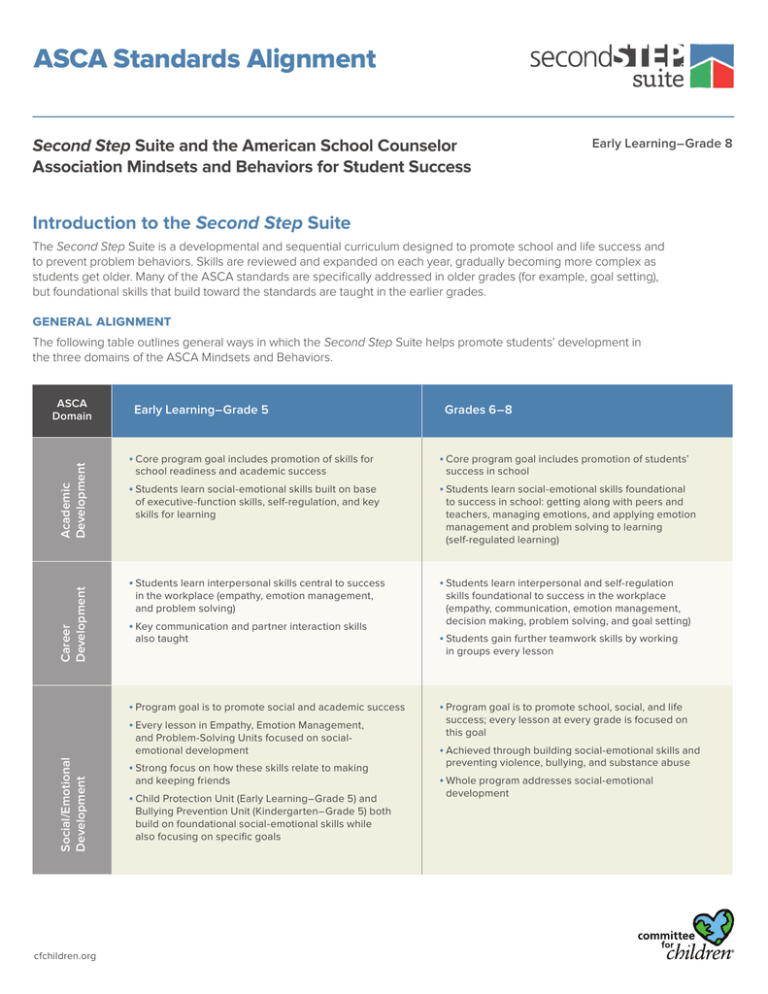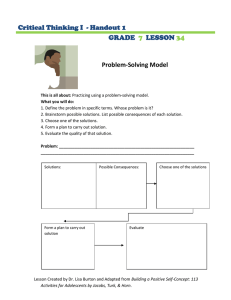ASCA Standards Alignment
advertisement

ASCA Standards Alignment suite Second Step Suite and the American School Counselor Association Mindsets and Behaviors for Student Success Early Learning–Grade 8 Introduction to the Second Step Suite The Second Step Suite is a developmental and sequential curriculum designed to promote school and life success and to prevent problem behaviors. Skills are reviewed and expanded on each year, gradually becoming more complex as students get older. Many of the ASCA standards are specifically addressed in older grades (for example, goal setting), but foundational skills that build toward the standards are taught in the earlier grades. General Alignment The following table outlines general ways in which the Second Step Suite helps promote students’ development in the three domains of the ASCA Mindsets and Behaviors. Career Development Academic Development ASCA Domain Early Learning–Grade 5 •Core program goal includes promotion of skills for •Core program goal includes promotion of students’ •Students learn social-emotional skills built on base •Students learn social-emotional skills foundational •Students learn interpersonal skills central to success •Students learn interpersonal and self-regulation school readiness and academic success of executive-function skills, self-regulation, and key skills for learning in the workplace (empathy, emotion management, and problem solving) •Key communication and partner interaction skills also taught •Program goal is to promote social and academic success •Every lesson in Empathy, Emotion Management, Social/Emotional Development and Problem-Solving Units focused on socialemotional development cfchildren.org Grades 6–8 •Strong focus on how these skills relate to making and keeping friends •Child Protection Unit (Early Learning–Grade 5) and Bullying Prevention Unit (Kindergarten–Grade 5) both build on foundational social-emotional skills while also focusing on specific goals success in school to success in school: getting along with peers and teachers, managing emotions, and applying emotion management and problem solving to learning (self-regulated learning) skills foundational to success in the workplace (empathy, communication, emotion management, decision making, problem solving, and goal setting) •Students gain further teamwork skills by working in groups every lesson •Program goal is to promote school, social, and life success; every lesson at every grade is focused on this goal •Achieved through building social-emotional skills and preventing violence, bullying, and substance abuse •Whole program addresses social-emotional development Alignment of the Second Step Suite and the ASCA Mindsets and Behaviors Specific Alignment suite The following table outlines specific grade-level units, lessons, activities, materials, and/or teaching strategies from the Second Step Suite that can help students develop the knowledge, skills, and attitudes needed to meet the 35 ASCA Mindset and Behavior Standards. Early Learning Kindergarten–Grade 3 Grades 4 & 5 Grades 6 & 7 Grade 8 Skills for Learning, Empathy, Emotion Management, Friendship Skills and Problem Solving, Child Protection* Skills for Learning, Empathy, Emotion Management, Problem Solving, Bullying Prevention*, Child Protection* Empathy and Skills for Learning, Emotion Management, Problem Solving, Bullying Prevention*, Child Protection* Empathy and Communication, Bullying Prevention, Emotion Management, Problem Solving, Substance Abuse Prevention Empathy and Communication, Bullying Prevention, Emotion Management, Goal Setting, Substance Abuse Prevention ASCA Mindset and Behavior Standards *Units sold separately Second Step Suite Early Learning Kindergarten & Grade 1 (K & G1) Grades 2 & 3 (G2 & G3) Grades 4 & 5 (G4 & G5) Grades 6–8 (G6, G7, & G8) Brain Builder Games Brain Builder Games Brain Builder Games Empathy and Skills for Learning Unit Skills for Learning Unit Skills for Learning Unit Skills for Learning Unit Skills for Learning Unit: Weekly Theme 1 Bullying Prevention Unit: Classroom Climate-Building Tools and Games Bullying Prevention Unit: Classroom Climate-Building Tools and Games Bullying Prevention Unit: Classroom Climate-Building Tools and Games 5. Belief in using abilities to their fullest to achieve high-quality results and outcomes Skills for Learning Unit: Weekly Theme 4 Skills for Learning Unit: Lesson 4 Skills for Learning Unit: G2, Lesson 3; G3, Lessons 2–4 Emotion Management Unit: G4, Lesson 12; G5, Lessons 11 and 12 6. Positive attitudes toward work and learning Skills for Learning Unit Empathy Unit: Lesson 10 Skills for Learning Unit: G3, Lesson 4 Problem-Solving Unit: Lessons 17–21 Problem-Solving Unit: K, Lessons 19–24; G1, Lessons 17–21 Empathy Unit: G2, Lesson 10; G3, Lesson 6 Bullying Prevention Unit: Lessons 1–4 Empathy Unit: Lesson 10 Skills for Learning Unit: G3, Lesson 4 Problem-Solving Unit: Lessons 17–21 Problem-Solving Unit: K, Lessons 19–24 ; G1, Lessons 17–21 Empathy Unit: G2, Lesson 10; G3, Lesson 6 Bullying Prevention Unit: Lessons 1–4 Skills for Learning Unit Skills for Learning Unit Empathy and Skills for Learning Unit Skills for Learning Unit: G3, Lesson 4 Problem-Solving Unit: Lesson 18 G6, Lesson 10, 11, 14 G7, Lesson 13 G8, Lessons 10–13 Empathy Unit: G2, Lesson 10; G3, Lesson 6 Empathy and Skills for Learning Unit: G4, Lessons 6 and 8; G5, Lessons 5 and 7 Problem-Solving Unit: Lessons 17–21 Problem-Solving Unit: Lessons 17–21 G6, Lessons 7, 10, 11, 12, 15 G7, Lessons 3, 5, 6, 7, 13 G8, Lessons 4, 10, 11, 13 Academic Integration Activities Academic Integration Activities 1. Belief in development of whole self, including a healthy balance of mental, social/emotional, and physical well-being 2. Self-confidence in ability to succeed Mindset 3. Sense of belonging in the school environment 4. Understanding that postsecondary education and life-long learning are necessary for long-term career success Behavior Standards: Learning Strategies 1. Demonstrate critical-thinking skills to make informed decisions Problem-Solving Unit: Weekly Themes 23–25 G6, Lessons 7, 10, 11, 12, 15 G7, Lessons 3, 5, 6, 7, 13 G8, Lessons 3, 4, 10, 11 Problem-Solving Unit: Lessons 17–21 2. Demonstrate creativity 3. Use time-management, organizational, and study skills 4. Apply self-motivation and self-direction to learning Skills for Learning Unit 5. Apply media and technology skills 6. Set high standards of quality 7. Identify long- and short-term academic, career, and social/emotional goals Emotion Management Unit: G3, Lesson 14 Problem-Solving Unit: Lesson 21, Home Link 8. Actively engage in challenging coursework 9. Gather evidence and consider multiple perspectives to make informed decisions 10. Participate in enrichment and extracurricular activities cfchildren.org Problem-Solving Unit: Weekly Themes 23–25 Curriculum Connections Empathy Unit: G1, Lessons 7–10 Problem-Solving Unit: K, Lessons 19–24 ; G1, Lessons 17–2 Academic Integration Activities Academic Integration Activities Child Protection Unit: Safety Card Research Project ©2015 Committee for Children Alignment of the Second Step Suite and the ASCA Mindsets and Behaviors suite ASCA Mindset and Behavior Standards 1. Demonstrate ability to assume responsibility Second Step Suite Early Learning Kindergarten & Grade 1 (K & G1) Grades 2 & 3 (G2 & G3) Grades 4 & 5 (G4 & G5) Grades 6–8 (G6, G7, & G8) Empathy Unit: Weekly Theme 11 Empathy Unit: K, Lesson 10 G1, Lesson 10 Empathy Unit: G2, Lesson 10 Emotion Management Unit: G4, Lessons 11–15 G5, Lessons 10–15 G6, Lessons 8, 9, 11 G7, Lesson 5 G8, Lessons 2, 3, 5, 10, 11 Emotion Management Unit: K, Lessons 13–18 G1, Lessons 13–16 Behavior Standards: Self-Management Skills 2. Demonstrate self-discipline and self-control 3. Demonstrate ability to work independently Brain Builder Games Skills for Learning Unit Emotion Management Unit: Lesson 13 Problem-Solving Unit: G2, Lesson 19 and Home Link 19 G3, Lesson 17 Brain Builder Games Brain Builder Games Emotion Management Unit: K, Lessons 13–17 G1, Lessons 13–16 Emotion Management Unit: G2, Lessons 12–16 G3, Lessons 13–16 Skills for Learning Unit Skills for Learning Unit Emotion Management Unit: G2, Lesson 16 Problem-Solving Unit: G4, Lesson 20 Bullying Prevention Unit: Introductory Lesson Emotion Management Unit: G4, Lessons 11–15 G5, Lessons 10–15 Empathy and Skills for Learning Unit: Lessons 1–3 4. Demonstrate ability to delay immediate gratification for long-term rewards Brain Builder Games Brain Builder Games Brain Builder Games 5. Demonstrate perseverance to achieve long-and short-term goals Emotion Management Unit: Weekly Theme 18 Emotion Management Unit: K, Lesson 15 Emotion Management Unit: G3, Lesson 14 Problem-Solving Unit: Lesson 18 6. Demonstrate ability to overcome barriers to learning Skills for Learning Unit Skills for Learning Unit Skills for Learning Unit Emotion Management Unit: G4, Lessons 12–14 G5, Lessons 11–15 7. Demonstrate effective coping skills when faced with a problem Friendship Skills and Problem-Solving Unit: Weekly Themes 23 and 24 Emotion Management Unit: G3, Lesson 14 Problem-Solving Unit: K, Lesson 19 G1, Lessons 17 and 18 Emotion Management Unit: Lessons 12–16 Problem-Solving Unit: Lessons 17 and 18 G6 and G7, Lessons 8 and 9 G8, Lesson 8 Emotion Management Unit: G4, Lessons 11–16 G5, Lessons 10–15 G8, Lessons 10 and 11 G6, Lessons 9–11 G7, Lessons 2, 3, 10 G8, Lesson 9 Problem-Solving Unit: Lessons 16 and 17 8. Demonstrate the ability to balance school, home, and community activities 9. Demonstrate personal safety skills 10. Demonstrate ability to manage transitions and ability to adapt to changing situations and responsibilities cfchildren.org Child Protection Unit Child Protection Unit Child Protection Unit Child Protection Unit G6, Lessons 6, 12–15 G7, Lessons 5–7 and 11–13 G8, Lessons 5, 7, 12, 13 G6, Lesson 1 ©2015 Committee for Children Alignment of the Second Step Suite and the ASCA Mindsets and Behaviors suite ASCA Mindset and Behavior Standards Early Learning Kindergarten & Grade 1 (K & G1) Grades 2 & 3 (G2 & G3) Grades 4 & 5 (G4 & G5) Grades 6–8 (G6, G7, & G8) 1. Use effective oral and written communication skills and listening skills Skills for Learning Unit Skills for Learning Unit Skills for Learning Unit Empathy and Skills for Learning Unit G6, Lessons 1, 2, 4, 5 G7, Lessons 1–4 G8, Lessons 1 and 3 2. Create positive and supportive relationships with other students Empathy Unit: Weekly Theme 12 Empathy Unit: Lesson 11 Empathy Unit: G2, Lesson 9; G3, Lessons 9 and 10 Empathy and Skills for Learning Unit: G4, Lessons 7–9; G5, Lesson 8 Friendship Skills and Problem-Solving Unit Problem-Solving Unit: K, Lessons 19–24; G1, Lessons 19–21 Problem-Solving Unit: Lessons 19–21 Problem-Solving Unit: G4, Lesson 19 G6, Lessons 1, 2, 7 G7, Lessons 4–6 G8, Lessons 2, 4, 5 Bullying Prevention Unit: Lesson 4 Bullying Prevention Unit: Lesson 4 Bullying Prevention Unit: Lessons 2–4 Skills for Learning Unit: Weekly Theme 6 Skills for Learning Unit: Lesson 5 Skills for Learning Unit: Grade 2, Lesson 4; Grade 3, Lesson 3 Empathy and Skills for Learning Unit: Lesson 3 Child Protection Unit Bullying Prevention Unit: Lessons 1–4 Bullying Prevention Unit: Lessons 2 and 4 Problem-Solving Unit: G5, Lesson 19 Child Protection Unit Child Protection Unit 3. Create relationships with adults that support success Behavior Standards: Social Skills Second Step Suite G6, Lesson 6 G7, Lessons 4 and 5 G8, Lesson 5 Bullying Prevention Unit: G4, Lessons 1–4; G5, Lessons 1–3 Child Protection Unit 4. Demonstrate empathy 5. Demonstrate ethical decision-making and social responsibility 6. Use effective collaboration and cooperation skills Empathy Unit Empathy Unit Empathy Unit Empathy and Skills for Learning Unit: G4, Lessons 1, 4–9; G5, Lessons 1, 4–8 Bullying Prevention Unit Bullying Prevention Unit Empathy Unit: Weekly Theme 12 Empathy Unit: Lesson 11 Friendship Skills and Problem-Solving Unit: Weekly Themes 19–21 Problem-Solving Unit: K, Lessons 20–22 G1, Lessons 19 and 20 Empathy Unit: G2, Lessons 8–10 G3, Lessons 6–9 Empathy and Skills for Learning Unit: G4, Lessons 4 and 6 G5, Lessons 5 and 6 Problem-Solving Unit: G2, Lessons 20 and 21 G3, Lesson 20 Emotion Management Unit: G5, Lesson 15 Friendship Skills and Problem-Solving Unit Problem-Solving Unit Problem-Solving Unit Problem-Solving Unit Think, Turn, Tell instructional strategy Think, Turn, Tell instructional strategy Think, Turn, Tell instructional strategy Bullying Prevention Unit: G4, Lesson 2; G5, Lessons 2 and 3 7. Use leadership and teamwork skills to work effectively in diverse teams 8. Demonstrate advocacy skills and ability to assert self, when necessary 9. Demonstrate social maturity and behaviors appropriate to the situations and environment cfchildren.org G6, Lessons 1–4, and 7 G7, Lessons 1–4 G8, Lessons 1–3 G6, Lesson 10 G7, Lesson 3 G8, Lesson 4 Lesson 1 G6 and G7, Lesson 1 G8, Lessons 1 and 6 Skills for Learning Unit: Weekly Themes 6 and 25 All Second Step Suite units Skills for Learning Unit: Lesson 5 Skills for Learning Unit: G2, Lesson 4; G3, Lesson 3 Empathy and Skills for Learning Unit: Lesson 3 Bullying Prevention Unit: Lessons 2–4 Problem-Solving Unit: Lessons 20 and 21 Emotion Management Unit: G5, Lessons 14 and 15 Bullying Prevention Unit: Lessons 2–4 Problem-Solving Unit: G4, Lesson 21 All Second Step Suite units All Second Step Suite units All Second Step Suite units G6, Lessons 5–7 G7, Lessons 4, 5, 7 G8, Lessons 3 and 7 Bullying Prevention Unit All Second Step Suite units ©2015 Committee for Children suite Safe, Supported, and Ready to Learn The Second Step Suite provides a fully integrated framework for protecting children and promoting social, emotional, and academic success. Use the Second Step Suite to build a caring community that improves learning and life. Contact Us: 800-634-4449 clientsupport@cfchildren.org Second Step Skills for Social and Academic Success Early Learning–Grade 8 Learn More: cfchildren.org/second-step Building an Environment for Learning Bullying Prevention Unit The Power to Create a Positive School Climate Kindergarten–Grade 5 Child Protection Unit Working Together to Keep Kids Safe from Abuse Early Learning–Grade 5 cfchildren.org


